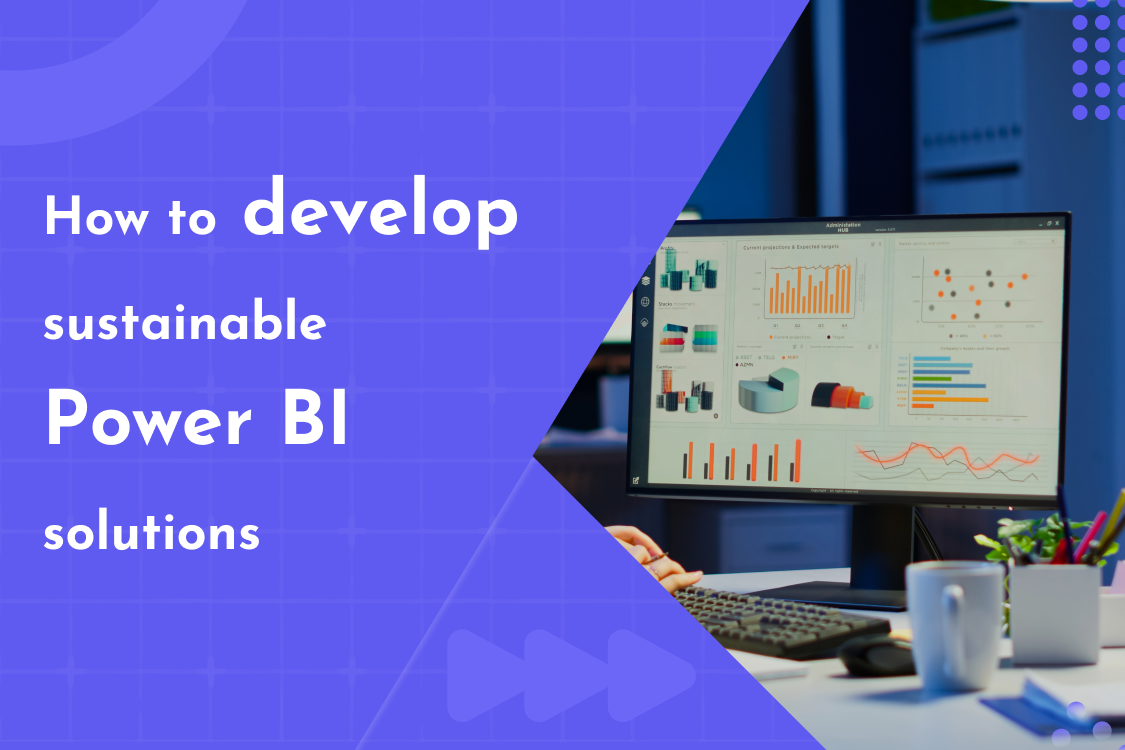We love to hear from you about your project.

Power BI is one of the most popular tools for data visualization and analysis, helping businesses make better, data-driven decisions. However, developing sustainable Power BI solutions can be challenging without the right approach. To ensure your Power BI solutions are effective in the long term, it’s essential to focus on key principles like scalability, security, collaboration, and adaptability. In this blog post, we'll explore how to develop sustainable Power BI solutions that grow with your business needs.
A sustainable Power BI solution is one that remains efficient, secure, and adaptable over time, while handling growing data volumes, ensuring accessibility, and delivering consistent performance. It should be flexible enough to meet your current needs while allowing room for expansion as your organization evolves.
Before you even begin building your Power BI solution, it’s important to have a clear understanding of your data architecture. A scalable architecture ensures that your Power BI reports can handle increasing data loads without performance issues. Be mindful of cloud versus on-premises data sources, and use the right data model to keep your reports fast and responsive. A well-thought-out architecture will save you from future headaches as your data and reporting requirements grow.
The foundation of any good Power BI report lies in the data. To develop a sustainable Power BI solution, it’s crucial to identify the right data sources from the start. Your solution should integrate seamlessly with various data sources like SQL, Excel, SharePoint, and other databases. Ensuring that your data is clean, accurate, and structured will make your Power BI reports much more reliable and easier to maintain.
Security is a top priority when developing Power BI solutions. Implementing strong security measures ensures that your sensitive business data is protected. Use tools like Active Directory and Role-Level Security (RLS) to control who can access specific data in your reports. A sustainable solution takes into account not just the data itself, but also who can view or modify it.
One of the most important aspects of a sustainable Power BI solution is collaboration. You’ll need input from a variety of stakeholders, including developers, data analysts, and business users. Establishing a cross-functional team ensures that the Power BI reports are designed to meet everyone’s needs and that they provide real value to the business.
Sustainability isn’t just about the initial development; it’s also about keeping your solution running smoothly over time. Power BI solutions should be regularly maintained and optimized. This includes updating data sources, optimizing reports for speed, and ensuring that the solution scales with new business requirements. Regular reviews will also help identify and resolve any issues before they impact the performance of your reports.
A sustainable Power BI solution ensures scalability, security, and flexibility while maintaining performance over time. It allows businesses to grow without worrying about outgrowing their data tools. Additionally, it offers long-term cost savings by reducing the need for constant rework and updates.
To ensure scalability, focus on optimizing the data model, using cloud storage for flexibility, and designing efficient data pipelines. Also, make sure that the solution can handle increasing data volumes without affecting performance. Regularly review and optimize your reports for better performance.
Collaboration between developers, analysts, and business users ensures that Power BI reports meet the needs of everyone involved. It helps in designing reports that provide real value, are user-friendly, and align with business goals, making the solution sustainable in the long run.
To maintain security, implement Role-Level Security (RLS) to control access to data, use tools like Active Directory for user management, and ensure that sensitive data is always protected. Regular audits and reviews of security settings will help keep your solution secure over time.
Regular maintenance includes reviewing data sources, optimizing reports, updating visuals, and ensuring that the solution scales with new business needs. Setting up automated data refreshes and troubleshooting any issues promptly will also keep your solution running smoothly.
Developing sustainable Power BI solutions doesn’t have to be difficult. By planning for scalability, securing your data, fostering collaboration, and maintaining your solution regularly, you can ensure that your Power BI solution continues to deliver valuable insights for years to come. Start small, iterate, and always keep future growth in mind. Following these steps will help you create Power BI reports that stand the test of time, offering consistent value to your business.
Note: Give us a call or leave a message, we endeavour to answer all enquiries within 24 hours on business days.
We love to hear from you about your project.
If you want to get a free consultation without any obligations, fill in the form below and we’ll get in touch with you.